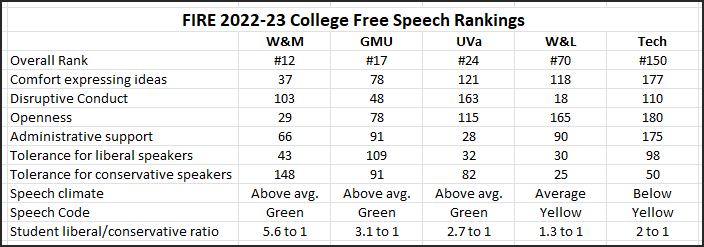
by James A. Bacon
Three Virginia universities scored in the top 25 institutions in the 2022-23 College Free Speech Rankings published this week by the Foundation for Individual Rights in Education (FIRE).
The College of William and Mary scored 12th among the 203 institutions ranked in the national survey of 44,900 undergraduate students. George Mason University ranked 17th, and the University of Virginia 24th.
Washington & Lee University ranked 70th, placing it in the top half, but Virginia Tech achieved a dismal 150th-place ranking, making it among the worst in the nation for free speech.
Institutions with the best rankings tended to score well in their formal, written speech codes, as determined by FIRE research based on formal university policies. Those policies are not necessarily honored in practice, however. Of potential concern to Bacon’s Rebellion readers, for example, W&M and UVa students expressed far less tolerance for conservative outside speakers than liberal speakers.
Access the full report here. Explore the data here.
FIRE definitions:
Comfort expressing ideas: Students were asked how comfortable they felt expressing their views on controversial topics in five different campus settings (e.g. in class or in the dining hall).
Tolerance for liberal speakers. Students were asked whether four speakers espousing views potentially offensive to conservatives (e.g., “Undocumented immigrants should be given the right to vote”) should be allowed on campus, regardless of whether they personally agreed with the speaker’s message.
Tolerance for conservative speakers. Students were also asked whether four speakers espousing views potentially offensive to liberals (e.g. “Black Lives Matter is a hate group”) should be allowed on campus, regardless of whether they personally agreed with the speaker’s message.
Disruptive conduct. Students were asked how acceptable or unacceptable it is to engage in different methods of protest against a campus speaker, including “Shouting down a speaker or trying to prevent them from speaking on campus.”
Administrative support. Students were asked how clear their campus administration’s stance on free speech is and how likely the administration would be to defend a speaker’s right to express their views if a controversy over speech occurred on campus.
Openness. Students were asked which of 17 issues (e.g. abortion, gun control, and racial inequality) were difficult to have open conversations about on campus.
FIRE Speech code rating: FIRE rates the written policies governing student speech at more than 475 institutions of higher education in the United States. Three substantive ratings are possible: “Red,” “Yellow,” and “Green.” The policies of an institution with a green light rating do not seriously threaten speech, although the rating does not indicate whether a college actively supports free expression.
What do the numbers mean?
FIRE has conducted campus-free-speech surveys for several years now, and each year it refines and improves its methodology. But the results still remain difficult to interpret.
For example, William and Mary scores commendably high in the rankings. In part, that reflects its formal written code, and in part it reflects students’ ease in expressing themselves. But note that of the five Virginia institutions, W&M has the highest ratio of liberal to conservative students. That lopsided ratio, combined with the overwhelmingly liberal/left leanings of faculty and staff (admittedly, a trait shared with most other higher-ed institutions) suggests that the political and cultural climate of W&M is more uniformly liberal than it is on other campuses.
If most faculty, staff, and students are largely in agreement about the most contentious issues of the times, it is not surprising that people feel more at ease expressing themselves. It does not mean they are more tolerant of differing views, as W&M’s 148th ranking for “tolerance of conservative speakers” makes clear. Thus, an ease and willingness to speak is not necessarily an indicator of a tolerance of diverse views.
Similarly, UVa shows a large gap between tolerance of liberal and conservative speakers, though not as wide as W&M.
Somewhat surprising (but encouraging), GMU, W&L and Tech students showed a slightly greater tolerance of conservative speakers than liberal, although the differences were not marked.
Before drawing any hard-and-fast conclusions about free speech on their campuses based on top-line numbers, students, parents, faculty, staff, and alumni should dig into the data to understand what is happening in their institutions.

Leave a Reply
You must be logged in to post a comment.